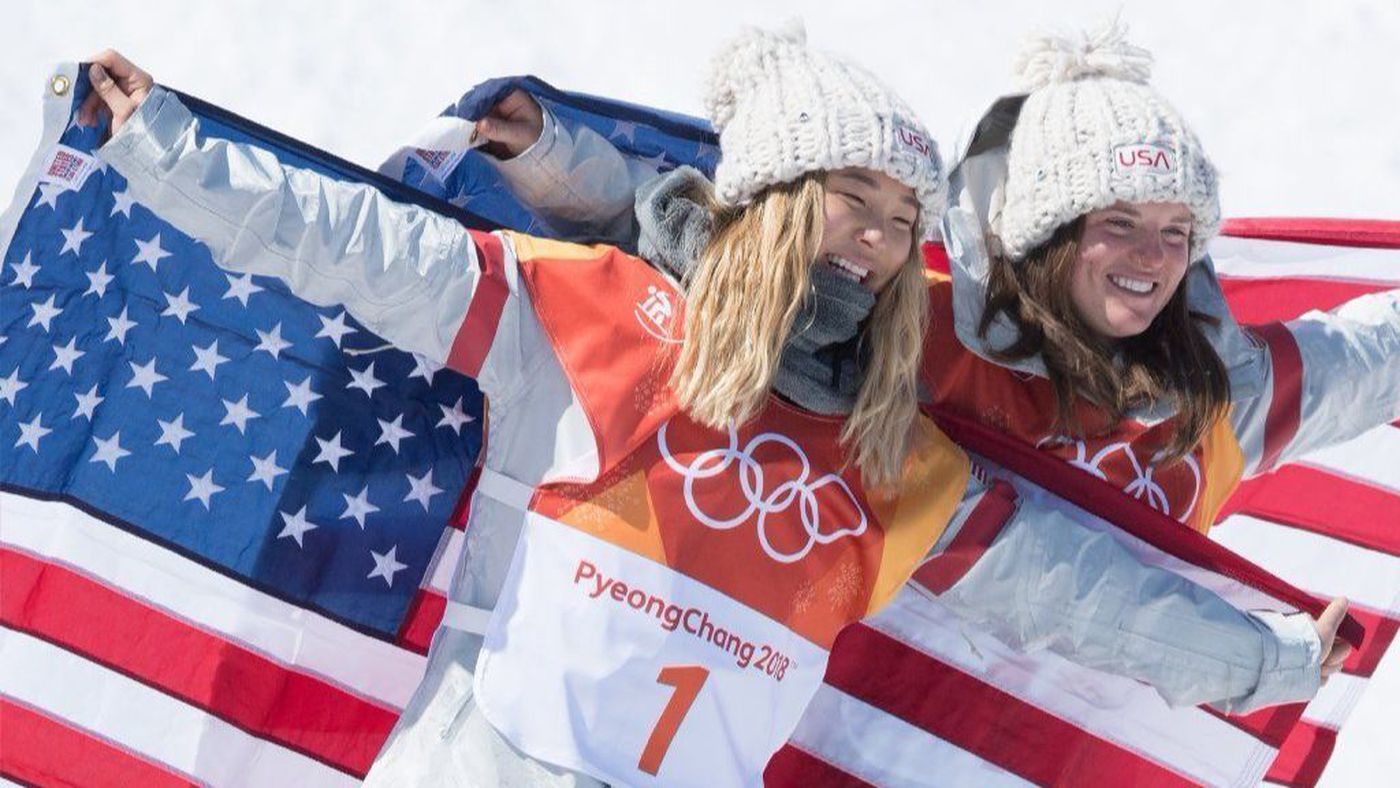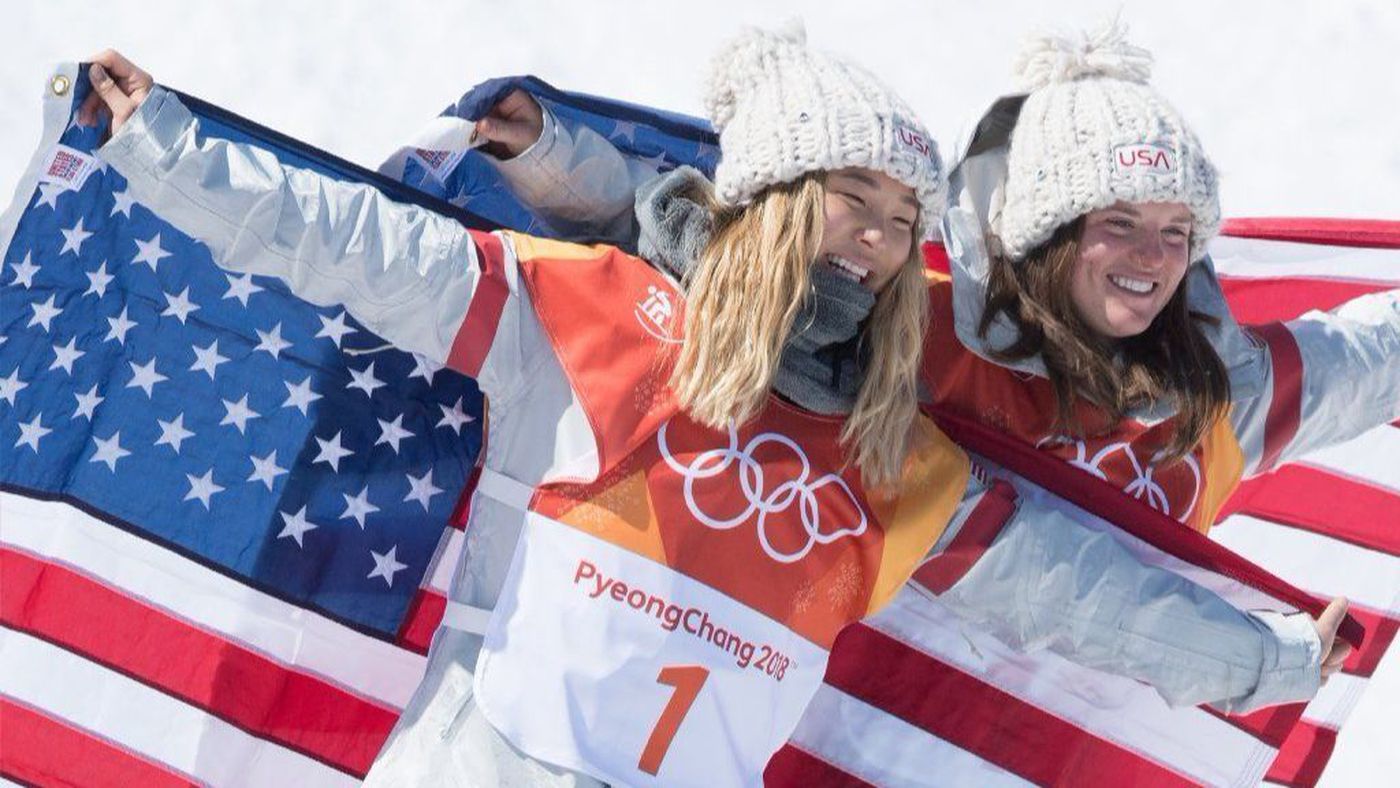For any Asian American person who faces the constant, clumsy question of “Where are you really from?,” the just-completed Winter Olympics in Pyeongchang, South Korea, offered us a few days of relief.
The iconography answered the question for us: the American flag stitched on snowboarder Chloe Kim’s coat and wrapped around her before the gold medal was placed around her neck. At figure skating, the announcer’s voice boomed: “Mirai Nagasu from Arcadia, California!” During the commercial breaks, figure skater Nathan Chen’s teeth were as white as any Coke-sponsored athletes’ have ever been.
These Olympics felt like a watershed moment because this time Asian Americans were not just members but the face of the team and among its best performers. But the joy I felt those two weeks was repeatedly interrupted by disappointment and anger at the way their stories were told.
I was excited at the news that Team USA included a record 11 Asian Americans, then rolled my eyes when it turns out the number was actually 14.
For weeks, I braced myself for a Western journalist to conclude that the practice of eating dogs was one of the main things American audiences should know about South Korea, and like clockwork, CNN delivered.
Being Asian American sometimes feels like rooting for a perennially underrated and forgotten team that almost never gets a nationally televised game and is rarely discussed as a title contender. And when you finally make it to the championships, somebody mispronounces your name and your city and doesn’t bother to apologize.
These cultural missteps have a long history. This year is the 20th anniversary of a now-infamous MSNBC.com headline announcing Tara Lipinski’s gold medal win: “American beats out Kwan.”
I contacted Edmundo Macedo, who was the executive sports editor of MSNBC.com at the time. I was hoping to discover some absolving circumstance that could counter the message I read in the headline: that people like me and like Kwan are not seen as American.
Was the headline writer working quickly and simply forgot to append the word “fellow” to the word “American” in the headline? Did an editor’s slippery fingers somehow erase a relevant word? Did the internet cut out? Was it lack of sleep? A typo? I was eager to embrace an alternate explanation, because truthfully, few of us enjoy being angry.
But I couldn’t find a satisfying answer. Macedo said the 1998-era content management system they were using was primitive and showed only the author of the most recent changes to the site. No one knows who wrote the headline, or even which section was responsible for it, and no one admitted to it. Macedo oversaw the section, but he did not oversee the writing of the headline.
Macedo, who later joined ESPN’s Content Diversity Task Force and even wrote a report about why ESPN should stop using the word “Redskins,” said he immediately knew what was wrong with the headline and would have stopped it if he could have. But he takes responsibility for the pain the headline caused.
“It’s painful to think about how it affected the people who saw it 20 years ago or hear about it to this day,” Macedo said. “It goes against everything I have stood for and fought for during my career prior to and after MSNBC.”
The headline on MSNBC was up for only about 15 minutes, and perhaps the author made an innocent mistake and learned a valuable lesson.
But four years later, at the next Winter Olympics, the Seattle Times made the same mistake, writing the sub-headline “American outshines Kwan, Slutskaya in skating surprise” for a story about skater Sarah Hughes winning the gold. Then, in 2012, ESPN ran the headline “Chink in The Armor” with a photo of Jeremy Lin.
And this month, a New York Times opinion editor called the California-born Nagasu an immigrant when tweeting in celebration of her triple axel.
These moments — admittedly digital and ephemeral — involve honest mistakes, or blameless technological mix-ups, or errors that are not made in malice or with any knowledge about their impact.
But I’m haunted by the message they send, nonetheless. And I wonder why it’s a mistake we keep making.
Joon Lee, a 22-year-old writer for Bleacher Report and one of the few Korean Americans covering the Olympics, was a toddler when MSNBC’s headline came out. But the message it perpetuated has echoed in many corners of his life, he said. After Kim’s gold medal win, he uploaded a photo of her family celebrating with the caption “an American family.”
The post, shared more than 13,000 times, wasn’t intended to be a political statement necessarily, but many of the people responding to him treated it as one. Some of his responders even mistook Lee for a foreign journalist, but he is American and grew up in Boston.
The Olympics have the tantalizing potential to expand the types of people we see as American, if we tell the stories of its athletes carefully. And part of my joy in watching them came from the rare pleasure of seeing these stories told as American narratives, with details that could be plucked from my own life.
It feels ridiculous that I see myself in these highly disciplined and supremely athletic Asian Americans, especially given how much barbecue I ate last Saturday. But there’s something undeniably familiar in their stories — their families.
After Kim won the gold, there was a moment in the NBC broadcast before the medal ceremony when she wandered around looking for her family, avoiding a gaggle of cameras. “Can we get my parents here?” she said, wanting to celebrate the win with the people who mattered to her most.
It was there, in the dead time between the competition and the ceremony, at an overheard bit of dialogue, that I was most overcome.
Jong Jin Kim arrived at Los Angeles International Airport in 1982 with $800 and an English-Korean dictionary. To launch Kim’s snowboarding career, he would drive five hours round trip every week, carrying his sleeping daughter from her bed to his car.
I am similarly overcome when I think of Nagasu’s parents working the dinner rush at Restaurant Kiyosuzu the night their daughter landed a triple axel and made Olympic history, and Vincent Zhou’s mom quitting her job to move to Southern California in an apartment that had no water or heat to help her son manage his figure skating career.
Their stories reminded me of how my parents rarely verbalize their love — rather, they submerge me in it. In place of words, they offer a blind and bottomless sacrifice. It is a debt that I don’t always know how to repay.
But during the Olympics, I can watch these athletes make their parents’ sacrifices made worthwhile in a single impossible moment. After watching Nagasu, I couldn’t help but wonder what journalism’s version of a triple axel would be, and how I could accomplish it.
This dynamic was something that Lee instinctively understood. Lee, whose parents came to the U.S. from South Korea in 1995, has covered Kim extensively in the months leading up to the Olympics. When she won the gold, he said, the moment felt oddly familiar.
“It felt like a moment that I had somewhat lived through to a certain extent,” Lee said. “It felt like everything had come full circle.”
It was never his parents’ American dream to have a son become a sports journalist, Lee said.
But his mother has always supported him, and his father, an accounting professor, got on board after seeing other Asian American journalists like ESPN’s Pablo Torre and Mina Kimes on TV, he said. Now his dad even reads all of his tweets, Lee said.
Lee’s parents are proud to see their son covering the Olympics. When his hand and cellphone appeared in the NBC broadcast, they took a screenshot and excitedly texted it to him. And after he filed his story on Kim’s gold medal win, he called his parents to talk about everything that had happened, and to say thank you.
These are the images — brief, beautiful moments during which all my painful questions are answered — that I will remember most from these Olympics.
Twitter: @frankshyong





